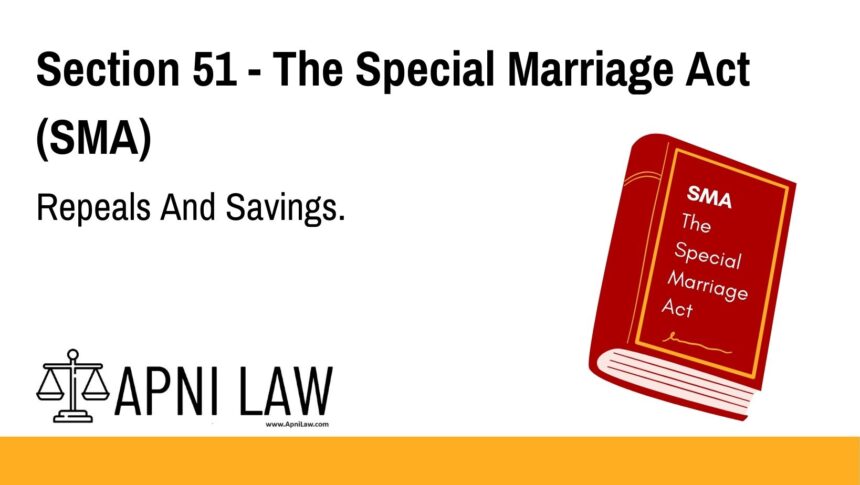Code: Section 51 – Repeals and Savings
(1) The Special Marriage Act, 1872 (3 of 1872), and any law corresponding to the Special Marriage Act, 1872 (3 of 1872), in force in any Part B State immediately before the commencement of this Act are hereby repealed.
(2) Notwithstanding such repeal—
(a) all marriages duly solemnized under the Special Marriage Act, 1872 (3 of 1872), or any such corresponding law shall be deemed to have been solemnized under this Act;
(b) all suits and proceedings in causes and matters matrimonial which, when this Act comes into operation, are pending in any court, shall be dealt with and decided by such court, so far as may be, as if they had been originally instituted therein under this Act.
(3) The provisions of sub-section (2) shall be without prejudice to the provisions contained in section 6 of the General Clauses Act, 1897 (10 of 1897), which shall also apply to the repeal of the corresponding law as if such corresponding law had been an enactment.
—
Explanation of Section 51 – Repeals and Savings
Section 51 of the Special Marriage Act, 1954 formally repeals the earlier Special Marriage Act of 1872 and any related laws that existed in Part B States before the 1954 Act came into effect. However, it ensures that actions taken under the repealed law continue to have legal validity under the current Act.
Key Points:
- The Special Marriage Act, 1872, and any analogous laws in Part B States are repealed.
- Despite this repeal:
- Marriages solemnized under the 1872 Act or similar laws are considered valid under the 1954 Act.
- Pending legal proceedings related to matrimonial matters will continue as though they were initiated under the 1954 Act.
- Section 6 of the General Clauses Act, 1897 is also invoked to preserve the effect of repealed laws, ensuring continuity and legal certainty.
This section safeguards previously solemnized marriages and ongoing legal proceedings during the transition from the 1872 Act to the 1954 Act, thus preventing legal vacuum or uncertainty.
—
Illustration
Example 1: Marriage Under the 1872 Act
A couple was married in 1945 under the Special Marriage Act, 1872. After the 1954 Act comes into effect, their marriage remains valid and is treated as if it was solemnized under the new Act.
Example 2: Pending Matrimonial Dispute
A matrimonial dispute was filed in 1953 under the 1872 Act. When the 1954 Act comes into force, the court continues to hear and decide the case as if it were filed under the current Act.
—
Common Questions and Answers on Section 51 SMA
1. What is the purpose of repealing the Special Marriage Act, 1872?
The purpose is to replace the outdated 1872 Act with the more comprehensive Special Marriage Act, 1954, while ensuring that marriages and proceedings under the old law remain valid and protected.
2. Will marriages registered under the 1872 Act remain valid?
Yes. Section 51(2)(a) confirms that all such marriages are deemed to have been solemnized under the 1954 Act.
3. What happens to ongoing court cases initiated under the old Act?
They continue as though they were filed under the 1954 Act, ensuring no disruption in legal proceedings.
4. What is the relevance of Section 6 of the General Clauses Act, 1897?
It ensures that rights, obligations, and legal proceedings under the repealed law are not automatically voided and continue as if the repeal never occurred, unless otherwise provided.
5. Does Section 51 affect laws in Part B States?
Yes. It repeals corresponding laws in Part B States that were in force prior to the 1954 Act’s commencement.
—
Conclusion
Section 51 of the Special Marriage Act, 1954 ensures a smooth legislative transition by repealing the earlier Special Marriage Act, 1872 while preserving the validity of past marriages and pending legal proceedings. This continuity strengthens legal certainty and respects prior rights under the former law.
Explore more such detailed insights on family and marriage laws at ApniLaw.








